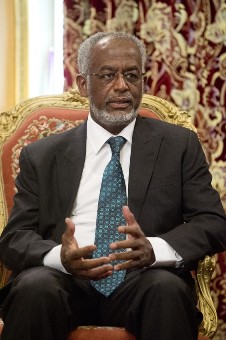Sudan affirms the internal nature of events in Egypt
July 5, 2013, (KHARTOUM) – The Sudanese foreign minister Ali Karti today phoned his Egyptian counterpart Mohamed Kamel Amr to get acquainted with the situation in the country following ouster of president Mohamed Morsi this week.

His overthrow was greeted with wild scenes of celebration but infuriated supporters who fear a return to the suppression of Islamists they endured under generations of military rule.
Dozens were killed and hundreds injured in the wake of clashes across Egypt.
The head of the constitutional court Adli Mansour was sworn in as Egypt’s interim president to oversee the transitional period.
Karti expressed hope to Amr that Egypt will enjoy security, stability and social peace, which he said is considered vital and strategic to its future.
He underscored the unique nature of of the relationship between the two countries and emphasized that is not affected by political developments.
The Sudanese top diplomat renewed Sudan’s position with respect to the will of the people and retaliated that what happened in Egypt is an internal matter.
Karti said he hopes that all parties in Egypt will give priority to maintaining security and stability to overcome the challenges at this critical stage in its history.
A year ago, Sudan expressed joy over the election of Morsi who hails from the MB and president Omer Hassan al-Bashir flew to Cairo to congratulate him in person.
The ruling National Congress Party (NCP) had expressed hope that a regime with a similar ideology, in the Arab world most populous country, would prove a strong ally against hostile local, regional and international forces.
The NCP vice chairman Nafie Ali Nafie made that clear during his visit to Cairo last March when he slammed opposition in both Egypt and Sudan.
“Opponents of the national dialogue in Sudan and Egypt are not with democracy and they want to establish a veto against the will of people in Sudan and Egypt. If the elections bring [a regime with] Islamic orientation in Egypt then it is rejected and if it brings the National Congress [Party] in Sudan then [polls] are rigged which represents an undemocratic trend of these forces which are not based on a popular base,” Nafie said at the time.
Unlike most Arab leaders, the Sudanese president has yet to congratulate interim Egyptian president on his new role.
(ST)
